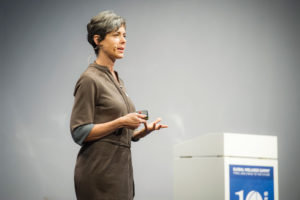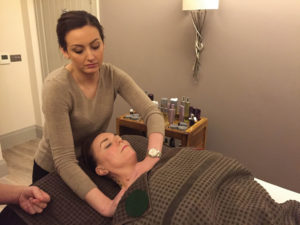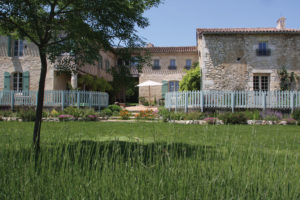
2017 Global Wellness Trends
Embracing the C-Word
Wellness industry stops turning away cancer sufferers and, instead, provides comfort, solace and positive recovery paths
Equality and fairness in wellness was a common theme at this year’s Summit. Cancer sufferers, typically under served when it comes to wellness options, made significant gains due to organizations like Wellness for Cancer. Julie Bach, who heads this educational platform that trains wellness companies on how to be better equipped to work with cancer patients, said: “The industry’s mantra in the past was ‘we serve well people’–a non-inclusive policy that is changing.”
Bach, who also heads up the GWI Initiative of the same name–Wellness for Cancer–acknowledged companies that are embracing cancer sufferers, and doing what the wellness industry does best: helping them reduce stress, find inner peace and increase emotional resiliency. Some of the trailblazers embracing cancer clients include All4Spas, Biologique Recherche, ESPA, Sanitas Skincare, The Red Door, Two Bunch Palms, Voya and Weight Watchers.
The Past: Fear and misinformation, along with costly insurance policies, meant spa and wellness businesses often excluded cancer sufferers.
The Future: Wellness embraces cancer in a big way-whether undergoing treatment or in recovery mode, cancer sufferers will find comfort and support in spa and wellness.
THE TREND

Here’s an unpleasant statistic: forty percent of us will suffer from cancer at some point during our lives. For a disease of such magnitude and impact, it’s notable that those suffering from its affects have been shunned by the spa and wellness industry. Much of the hesitation is due to misinformation – could massage spread the effects of a tumor, for example?–but it also has a lot to do with insurance policies in many countries that made working on guests with cancer prohibitively costly due, in large part, to the aforementioned misinformation. Sadly, an industry that prides itself on prevention practices has often refused some of the very people that need their services most.
And, let’s not forget, “well” people become “dis-eased” people all the time. Not working on a loyal client simply because he/she is suffering from an ailment like cancer is counter-intuitive to everything “wellness” stands for.
“PSYCHOSOCIAL” ONCOLOGY PUTS PATIENT’S WELL-BEING FIRST
There’s reason to cheer the spa and wellness world embracing this critically important issue–during this year’s Summit, companies like Biologique Recherche, Spafinder Wellness and Voya announced their continued support of cancer research–and studies are emerging on the psychological effects cancer has on patients. Dubbed “psychosocial oncology,” this research focuses on the issues beyond traditional medical treatments for cancer patients–and, crucially, has slowly begun to create a much more patient centric environment for cancer care. In fact, just last year in the U.S., the American College of Surgeons decreed that all cancer centers had to have an onsite psychosocial program to get stressed patients into appropriate care.
Of course, we have a long way to go before “wellness” becomes front and center of cancer care but all indications are that the mental toll cancer takes on a patient can be radically lessened by much of what spas have to offer. For example, the inevitable depression that comes with a cancer diagnosis can be abated by mindfulness meditation, while exercise can excite the endorphins; anxiety caused by body image issues can be lessened by touch; skin affected by chemotherapy burns can be soothed and improved with a myriad of treatments; while permanent make up can make a real difference for those suffering from facial hair loss.

LOOKING GOOD IS PART OF FEELING GOOD
In practical terms, doctors and drugs might save your life, but the desire-and need-to look good doesn’t simply disappear with a cancer diagnosis. So, once radiology or chemotherapy is underway, there’s a real need to fight the changes it makes to your skin tone and feel. Natura Bissé, a Spanish skin care company that works in collaboration with dermatologists, psychologists and oncologists to develop a program to train estheticians in “oncological aesthetics” who go so far as to visit hospitalized patients to help them feel well, beautiful and cared for, has long been ahead of this trend and conducted a workshop at the 2014 Summit in Mexico City.
MEDICAL EVIDENCE SUPPORTS WELLNESS IN CANCER CARE
It’s worth noting that most of the positive evidence for wellness–from acupuncture to massage–has been done in the name of cancer care. The reason is simple: cancer funding can support such studies. Specific examples: Manual lymph drainage has been tied to preventing secondary lymphedema in women who’ve had surgery for breast cancer, while massage has been proven to reduce nausea in women with breast cancer undergoing chemotherapy, according to a University of Göteborg trial. A National Taiwan University review reported yoga has a “more positive impact” than supportive group therapy when it comes to reducing anxiety, depression, and stress in cancer patients. While mindfulness/ meditation is known to be a huge disrupter of stress and anxiety-issues cancer patients deal with throughout their diagnosis, treatment and recovery.
WELLNESS DESTINATIONS LEADING BY EXAMPLE
This year’s Summit co-chair, Sue Harmsworth, CEO of ESPA, helps lead this charge with the program she developed in conjunction with Wellness for Cancer, “ESPA Nurture & Support,” specifically designed to help relax, nurture and support guess dealing with cancer. The program was recently added to the ESPA’s flagship spa, ESPA Life at the Corinthia in London, U.K.
Ananda in the Himalayas recently hosted Wellness for Cancer training followed by community outreach by a specially trained hospice team to spread cancer care throughout the local villages, a move that resonates with another common theme at this year’s Summit: the call for universal wellness beyond property “walls” or or “Beyond the Elite Ghettos of Wellness.”
California’s Two Bunch Palms has added a Mindful Touch Massage by certified Cancer for Wellness therapists to its extensive menu that included energy healing. All five of the UK-based Center Parcs’ Aqua Sana spa locations are also offering a range of treatments for those affected by cancer.
These examples join existing programs at Pennyhill Park, Bedford Lodge Hotel & Spa and Calcot Lodge in the UK, Voya in Ireland, and Estancia Hotel and Spa in California. As well as destination resorts like The Farm at San Benito in the Philippines, which offers natural and holistic 6-night integrative cancer care program; Puyssentut’s week-long post-cancer retreats at its restored chateau in south-west France; and Grayshott Spa in the UK’s special program to care for people after cancer treatment (with nurses, wellness practitioners, nutritionists, etc.)

THE FUTURE
We predict even more wellness businesses and spas will pursue cancer-focused education to train staff. Already, there are “Wellness for Cancer” trainers on virtually every continent, including San Diego, CA-based Bellus Academy, a leading beauty school in the US which is the first beauty and wellness academy in the U.S. to offer the Wellness for Cancer curriculum. And, in the UK, Beauty Despite Cancer is also offering accredited training programs. While organizations like the Canadian-based Cancer Exercise Training Institute delivers online cancer-specific exercise training courses for professionals.
This more “inclusive” model of wellness will shape a world where wellness pursuits are created equal for those who are well and those who have dis-ease.

program. Image Source: The Farm at San Benito
Copyright © 2016-2017 by Global Wellness Summit.
If you cite ideas and information in this report please credit “2017 Wellness Trends, from the Global Wellness Summit.”
For more information, email [email protected].
